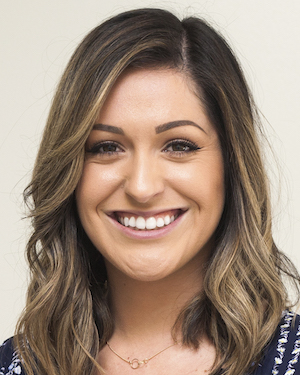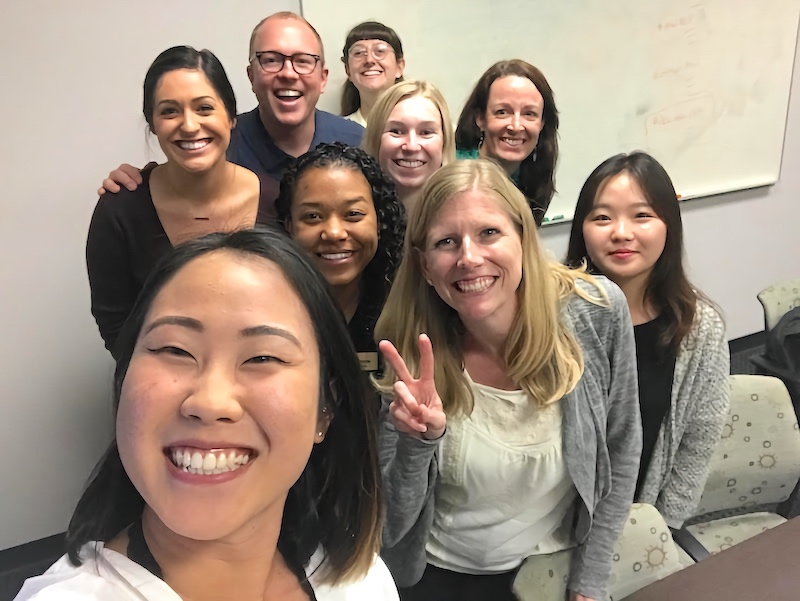Student Blog
Melissa

Increasing Diversity — Semester Review ⟩
December 21, 2018, by Melissa
Hey everyone! As we’re getting ready to go on break, I’ve had some time to reflect on this past semester, and look at everything we’ve managed to accomplish in our short time as Student Ambassadors. Increasing diversity within our program and the field of occupational therapy is a goal that took priority for Serena (another wonderful Student Ambassador) and myself. USC prides itself on being one of the most diverse occupational therapy programs. However there is still a lack of minority representation, particularly a lack of Hispanic and African American students. The same can be said of our profession as a whole, therefore we established some goals related to increasing diversity within the division, and we couldn’t wait to get started!
When you have a team and program that is equally as passionate about your goals as you are, it’s hard not to over-achieve. We dove right into recruiting and presenting at different clubs and universities in the area, and we were excited to reap the rewards of our hard work. We had lots of ideas, and we thought that improved minority representation would come quickly. Studies have shown that patients have better health outcomes when they work with clinicians that have a similar cultural background, and working in Los Angeles we will encounter patients from different minority backgrounds.Therefore, this goal is of particular importance to us because of the makeup of our patient population, and the cultural discrepancy between the clinicians that serve them.
As the semester went on, we realized that our goals were a bit lofty for a position we’d be in for less than a year, as it can take a long time to establish a single long-term relationship. We focused on reaching out to as many programs and clubs as we could, in an attempt to have the most impact possible. However, our progress was not as rapid as we would have liked, so we’ve begun to reconfigure our goals to be more achievable in the amount of time that we have left in this position. Our supervisor has been instrumental in helping us view where we’ve fallen short of our expectations as something to learn from, and as an opportunity for growth. Most importantly, we have not lost our excitement and passion surrounding increasing diversity!
Being able to tackle diversity as one of my goals is only possible because of the support that I have from my team and the Chan division. It’s been incredible to work alongside faculty and staff within the program that also value this goal as much as I do. If you ever have any questions regarding diversity within our program or within our profession, feel free to reach out! And as always, fight on!
⋯

Preparing For Finals ⟩
December 3, 2018, by Melissa
Hey everyone! This semester is quickly coming to an end and I’m in the process of preparing for finals. It’s both an exhausting time and an exciting time, as I am so close to the end of the semester, but I have to get through finals first! Being at this stage made me want to write a bit about my approach to finals, especially with work being factored into my schedule.
First and foremost, organization is KEY. I like to look ahead at my work calendars so that I can schedule different sessions for studying when I’m not in class or at work. I also like to get together with my classmates to study in a group so that they can help keep me accountable. Otherwise, I get sucked into a Netflix binge session that is no good for anyone. Living in downtown also gives me access to lots of cute coffee shops that have great coffee and a cozy ambience that helps me stay focused.

Hazelnut Latte from Loit Cafe in Downtown LA
Don’t get me wrong though, finding the motivation to push through to the end of the semester is hard. Senioritis is REAL, and I’m very tired. But that’s why it’s so important to have a good support system, both inside and the outside of the program. I have such a great group of classmates that I’ve met in the program that offer constant support and motivation, and my family and friends outside of the program help me unwind and enjoy the little free time that I have.
Fortunately, I know that I’ll get through this, just as I have gotten through every other set of finals in my academic career. Just stay strong, push through, and remember why you started.
Good luck to everyone going into finals this semester, and fight on!
⋯

Financing USC: What You Need to Know ⟩
November 16, 2018, by Melissa
As we’ve gotten closer to the application deadline, one of the questions I’ve gotten the most concerns paying for USC and whether the “financial burden” is worth it. Thus, I wanted to take the time to give you guys some insight as to what my thought process looked like when I was applying, and why I feel like coming to USC was the best decision I’ve ever made.
First of all, I want to validate your concerns and let you know that it is completely normal to be intimidated by the cost of tuition at our program. It is more expensive than most programs, and it may feel like a lot to take on. However, I think it’s important that you know what your financing options are before you make a decision. I will admit that to me, it was a bit of a no-brainer. Despite the fact that I was intimidated by the cost of the program, that intimidation was offset by my excitement to be a part of USC Chan. Our program is known to be a leader in the field of occupational therapy, and I truly wanted to be a part of that. In addition, my fears were further ameliorated when I attended an information session and learned more about the aid USC offers, as well as the Federal Loan Forgiveness Program (which I will talk more about below). I was happy to know that I had options, and that made my decision far less daunting, which is why I want to share that information with all of you!
Jessica, a previous Student Ambassador, wrote a “Financing USC” blog series which consists of a couple of blog posts outlining how you can pay for the program. They include information on federal loans available to graduate students and the Loan Forgiveness Program, division scholarships and research assistantships, and student worker positions! Student worker positions are a great way to get involved in the division, and they include the Student Ambassador position that I’m in right now! I also work as a research assistant for one of the many research studies currently being conducted by the division, which is a great opportunity students have available to them as well.
Lastly, I want to talk to you a bit more about the Public Service Loan Forgiveness Program available to students that have taken out federal loans and work in a non-profit setting after they’ve graduated. This program requires that you make 120 payments towards your loans (which is about 10 years), and then waives or “forgives” the remaining balance after you’ve made those payments. Examples of non-profit settings include — but are not limited to — hospitals, some outpatient clinics, and even universities. As OTs, there is a high chance that we may end up working at a site that is considered a non-profit, which means we can qualify for this program! I do want to add that this program only waives federal loans, and not private loans that have been taken out in addition to federal ones.
I highly encourage prospective students to weigh their options before making a decision, and not to let the finances intimidate you from applying/attending USC. After being here for the last year and a half, I truly feel like I made the best decision coming to USC, as the education I’ve received is of the highest caliber. In addition, I have had access to professors and clinicians who are leaders and innovators in the field, which has been instrumental in my own career development. Just know that you have lots of options, and I would be happy to talk to you guys about this further if you have any other questions or concerns!
⋯

What is it like to be a Student Ambassador? ⟩
November 4, 2018, by Melissa
Hey guys! For this post I wanted to talk a bit about what I do as a Student Ambassador. I feel like we do a bit of everything, therefore I wanted to offer some more insight in case any of you would like to pursue this position when you’re in the program!
First, I want to provide a bit of background information on my journey to becoming a Student Ambassador. When I was first considering applying to USC, I attended an information session and had my first interaction with an Ambassador. I remember thinking, “Wow, that’s such a cool opportunity for students!” but didn’t think much about it after that as I was more concerned with getting into the program at the time. As the application date got closer, I scheduled a meeting with Dr. Carley — the previous Director of Admissions — and a tour with a Student Ambassador. It was an incredibly personal experience; Dr. Carley answered some of my burning questions about the application, and the ambassador shared about her experience with the program and answered my questions regarding life as a student. It was then that I realized how badly I wanted to get into the OT program at USC, and how much I would love to be a Student Ambassador.
Fast-forward two years, and here I am! It’s still pretty surreal to think back to that time, and I’m incredibly grateful to be able to be a part of this program and to be an Ambassador. This position gives me the opportunity to combine my passion for the program and my passion for occupational therapy all into one!
So what exactly do we do? Well, I wasn’t kidding when I said that we do a little bit of everything. We help with information sessions, we correspond with potential applicants and admitted students, we give presentations to pre-health and pre-OT clubs to spread the word about our program and OT as a whole, we present and table at conferences and grad fairs, we give tours to students and their families, and help with all sorts of events! Although there are things that we all do as Ambassadors, there are also things that are unique to each of our positions! For example, Joyce is in charge of all things social media, Serena and I help the admissions team and have Diversity projects that we work on, Jess is responsible for event planning, and Evan works on the content calendar! We each get to work on things that appeal to us and that we have a skill set in, which makes the job even more interesting. In addition, we have an Ambassador from the OTD program as well as the MA-I (post professional) program, which makes us a pretty well rounded team. They each correspond with students that have questions about their specific programs, and have their own individual projects as well.
Ultimately, this job provides us with a great opportunity to advocate for our profession, to increase awareness about OT and the Chan program, and to give potential applicants information about our program from a student’s point of view, among many other things. I’m very lucky to be a part of a team that is made up of such kind, hard-working, and passionate people that make the job so much fun.
If you have any questions about the position or about scheduling a tour with us, feel free to reach out!

⋯

Fieldwork in Pediatric Mental Health ⟩
October 23, 2018, by Melissa
Hey everyone! I wanted to talk to you guys about my experience working in pediatric mental health, as I recently completed my full week for my level I fieldwork. For those of you that don’t know a lot about what fieldwork means and what that looks like in our program, Joyce does a great job of explaining it in her blog and you can also find additional information here.
I’m not sure how much you guys already know about OT’s role in pediatric mental health, but I knew very little before taking part in this internship. This is not your typical pediatric placement, as I don’t have an occupational therapist onsite, nor am I seeing children with specific developmental or intellectual disabilities. Instead, I work with children in the early intervention program that are between the ages of 3 and 5 who have been exposed to some sort of trauma. The trauma includes, but is not limited to, domestic violence, physical abuse, sexual abuse, psychological abuse, and being removed from the home. Because of this trauma, children exhibit behaviors that prevent them from being able to participate in a typical classroom setting. Thus, they are sent to the Los Angeles Child Guidance Clinic — where I am placed this semester — in hopes that receiving mental health services can help them get back to their previous school settings.
Young children exposed to trauma often do not have the ability to understand what they have gone through. Some may be removed from their homes for an extended period of time, and others may be adopted by someone in their extended family. This is all happening while they are trying to build healthy attachments with their caregivers, which is crucial to their psychosocial development. As a result, these children may present with aggressive behaviors or tantrums that stem from an inability to regulate how their body is feeling, and that is where OTs come in! Due to our expertise in sensory strategies and techniques, we are able to give children that are presenting with dysregulation the tools they need to successfully regulate their bodies and emotions.
My favorite part about our level I fieldwork experience is the full week, as I feel that that is when I get a true feel for what my role as an OT looks like at my placement. This semester has not been different, and I feel like I have a much better understanding of what OTs role in pediatric mental health looks like. Although I do not have an OT onsite to shadow, I feel confident in my understanding of OTs role. If you ever find yourself in a similar situation, don’t be scared! You have an excellent team behind you at USC, and you should use them whenever you can. My experience has been that sites truly value occupational therapy, and are always grateful to host students. If you ever have any questions about fieldwork, pediatric mental health, or being placed at a site without an OT, don’t hesitate to reach out!
⋯





